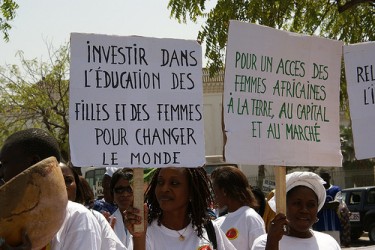This July 1, 2012, the Senegalese will be called again to the polls for parliamentary elections. These forthcoming elections will be a first for West Africa, as the law on absolute gender parity in electoral lists will be applied for the first time.
The debates are lively, and numerous initiatives for women's significant involvement are ongoing across the country's social networks.
In a post on lesenegalais.net, Maté Dagnokho recalls [fr] some figures from the 2007 legislative elections:
Faut-il rappeler qu'en 2007, 14 partis et coalitions de partis étaient en lice avec 3 581 candidats à la députation. En 2012, 7 200 candidats vont «courtiser», pendant 3 semaines, les 5 millions d’électeurs pour obtenir un ticket et siéger à l’hémicycle avec une écharpe aux couleurs nationales afin de plaider les doléances de leurs mandants.

Posters read: (l) “Invest in education of girls and women to change the world” and (r) “For access of African women to land, capital and markets”. Image by Flickr user CNCD-11.11.11 (CC BY-NC-SA 2.0).
Sitimrew News recalls [fr] that during the 2007 parliamentary elections, the proportion of women elected increased compared to in 2002. It adds that:
La 14ème législature de 2012 est venue accélérer le rythme, obligeant à chacune des 24 listes en compétition, à respecter la parité. Autrement dit, le mode de désignation est le suivant : Un homme-Une femme, bien que l’inverse soit possible : Une femme-un homme. Ce qui doit aboutir à un Parlement coloré, à 50% de femmes et autant d’hommes.
Numerous training seminars for female leaders were held across the country. On rofaf.org, Mbagnick Kharachi, who covered a story that took place in St. Louis, the ancient capital of Senegal, emphasizes [fr] the preparation of candidates in defending their viewpoints:
Sarr Sow, s'est réjouie de la mobilisation des femmes investies. Celles-ci ont suivi, dans les locaux du Conseil régional de Saint-Louis, les travaux d'ateliers et des simulations de meetings et débats parlementaires.
Quoting [fr] Ms. Saly Doumbouya, vice-chair of the Council of Rural Inor, Moussa Drame notes:
qu’il est vraiment grand temps que les gens, les femmes en particulier, vivent la parité dans nos sociétés car nous avons fait le constat que cela augmente leur pouvoir.
Video of Ndella Madior Diouf, leading candidate of the national party Taxawou Askanwi:
Issa Ndiaye's post, published [fr] on the online portal seneweb.com, regarding doubts about women's ability to fulfill their role of the elected people, has provoked a number of comments, some of which are very appropriate. For example, Kardiatou Dia says [fr]:
Vous serez a la hauteur mesdames, que dieu vous guide et résout vos problèmes; ce n’ est pas évident de trouvez le juste milieu de ce problème pour satisfaire le peuple sénégalais, bon courage.
In another comment from the same article, Salambaye commented on the implications of the dress code [fr]:
une assemblée ou hommes et femmes sont tous en grands boubous et pagnes, on risque de se glisser vers une assemblée religieuse…….puisque ces habits sont portès souvent dans les evenements religieux……..
Assemblée admits [fr] that she is not pleased with the comments that were published following this article. She says:
Je suis remontée quand je lis des écrits de cette teneur (aucune consistance, aucune objectivité). Pourquoi bon sang on ne parle pas de compétence des députés, conseillers et autres que quand il s'agit de femmes. J'ai fréquenté l'Assemblée nationale et je voyais des hommes ronfler en pleine plénière.
Feug gives her opinion [fr] on the debate sparked by the article:
propos machistes comme d'habitude. il y a eu des hommes encore plus ignares dans les assemblées précédentes , si vous avez eu à écouter parfois les débats , vous vous rendez compte que c ‘est KIF/KIF .
les femmes (..) ont beaucoup de bon sens . je me souviens qu ‘Adja Arame DIENE ( paix à son ame) faisait des interventions de bon sens par rapport au quotidien d ‘une mère de famille!!!
Women (..) have a no-nonsense approach. I remember that Adja Arame DIENE (may God rest her soul) made interventions with plenty of common sense with respect to the daily life of a mother!
From the perspective of supporters of a real participation of women in political life, the true concern is the fact that some parties seek to get around the law by giving the women the role of stand-in. Thus, Boly Bah reveals [fr] in a post published by lagazette.sn:
N’empêche, la parité peine à dissimuler cette vieille pratique machiste des politiques. Sur les 24 listes en compétition, seule Ndella Diouf est tête de liste nationale. Bien maigre ! Les femmes sont logées en deuxième position au moment où certaines ne sont pas tout simplement zappées de leur coalition originelle.
But the women are also getting organized to ensure that the elections are transparent. They have have created a platform [fr] of awareness, mobilization and electoral observation for the elections on July 1, at the initiative of several NGOs. The site ferloo.com informs [fr] that:
Des activités de sensibilisation sur la Loi sur la Parité et de mobilisation des femmes et des jeunes seront organisées, ainsi que la formation et le déploiement de plus de 50 observatrices électorales et journalistes moniteurs à Dakar et dans les régions le jour des élections pour observer le scrutin et le niveau de participation politique des femmes, en tant qu’électrices et en tant que candidates.
After these elections, Senegal could be the second African country, after Rwanda, to apply absolute parity in parliament. However, the parties have not always presented women candidates very favourably. No matter the number of those who will actually manage to enter parliament, the parity law is a major step towards greater democracy.






